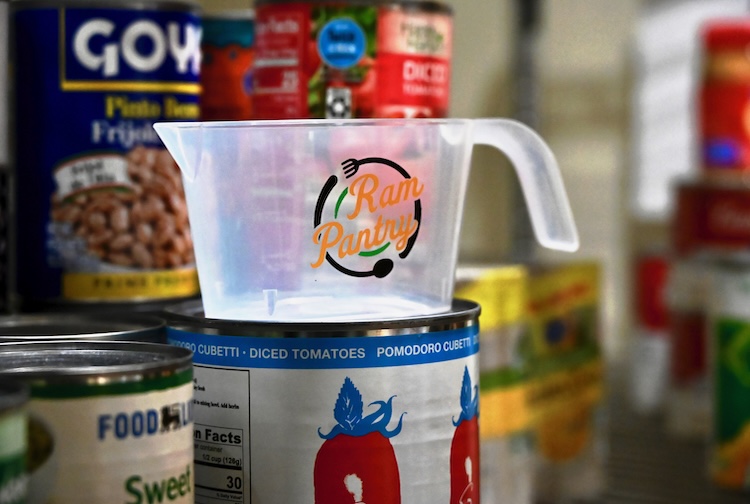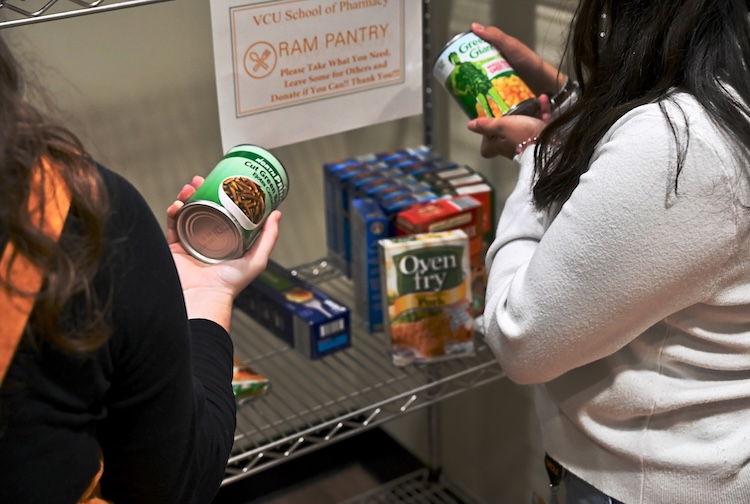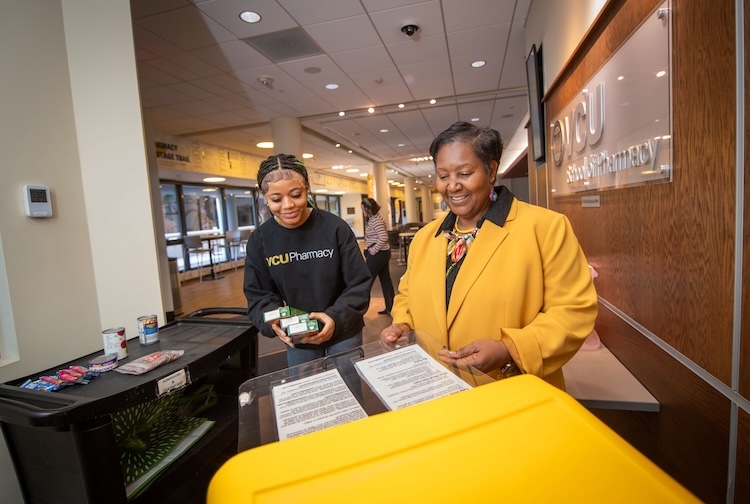Little Ram Pantries adds locations on MCV Campus
The food-insecurity initiative lets VCU students discreetly access free nonperishable food and toiletries.
November 03, 2025 The Little Ram Pantries initiative is expanding on the academic medical center campus to support students who may be facing food insecurity. (Sara McCloskey-Nieves, Enterprise Marketing and Communications)
The Little Ram Pantries initiative is expanding on the academic medical center campus to support students who may be facing food insecurity. (Sara McCloskey-Nieves, Enterprise Marketing and Communications)
By Haley Tenore
Among the many challenges students face when entering college – moving away from home, living with a roommate, adapting to tough courses – one of the biggest can be one of the most basic: finding the next meal.
“I was food-insecure when I was in college, but I didn’t realize it at the time. I grew up in poverty, and when I turned 18 and went off to college, I suddenly didn’t become food-secure,” said John C. Jones, Ph.D., an assistant professor in Virginia Commonwealth University’s School of Life Sciences and Sustainability. “Once I stopped using the meal plan my junior year, I really struggled to feed myself and that hurt me academically.”
Inspired by his own experience – and mirroring the community library stands that dot neighborhood landscapes – Jones established the Little Ram Pantries initiative. The yellow stands first appeared at VCU in late 2021, and in late September this year, an additional 10 pantries were introduced across the MCV Campus – bringing the total across both VCU campuses to 18, along with two Ram Fridges on the Monroe Park Campus.
Student and staff volunteers restock pantries with nonperishable food items and toiletries every week. Items are free for students, and those who use the pantries remain anonymous.
“One of the messages, besides that we’re here to help you, is that there is no judgment here, and there’s no one who’s trying to find out who is utilizing the pantries. We just want to make sure that it meets the needs of those who would like to utilize them,” said Sheryl Garland, chief of health impact at VCU Health. Garland leads a group of committed individuals who coordinated the latest pantries across the MCV Campus and other efforts to address food insecurity.
Jones launched Little Ram Pantries as a pilot program consisting of a handful of locations on the Monroe Park Campus with support of a VCU community-engaged research grant. By early 2022, a half-dozen more locations were added across both campuses. His ongoing research shows that people interact with the Little Ram Pantries thousands of times each school year, with the most visible and highest foot-traffic locations being the most used.

There are 10 additional Little Ram Pantries around the MCV Campus. (Sara McCloskey-Nieves, Enterprise Marketing and Communications)
A 2023 study led by School of Social Work professor Youngmi Kim, Ph.D., found that about 35% of VCU students report experiencing some form of food insecurity. Little Ram Pantries is among ongoing efforts to address the challenge, as is the larger Ram Pantry program that has served VCU for more than a decade. A recent focus group study led by Kim found that the anonymous and decentralized nature of Little Ram Pantries may lower the stigma that some students may feel towards receiving emergency food assistance.
Jones warns against the assumption that someone entering adulthood – a life transition often associated with college – is leaving behind an entrenched issue from childhood.
“There is a presumption that once someone graduates high school, they suddenly become a completely functioning adult and can take care of themselves, and the data just doesn’t align with that imagined reality,” he said. “If someone is food-insecure when they’re in high school and they transition to college, there is a strong likelihood they’re still going to be food-insecure. So, especially for institutions that work to attract first-generation students like VCU, we have a duty to try to assist those students.”
Such support can be the difference between a student remaining enrolled and ultimately completing their degree.
“If you’re in class and struggling and focusing on where your next meal is going to come from, it’s going to be difficult to complete all the tasks that you need to be a successful college student,” said Brooks Baker, coordinator of food access initiatives in VCU’s Office of Student Advocacy. “We encourage any student who is struggling to feed themselves to visit the Ram Pantry (930 W. Grace St.) or to visit one of the Little Ram Pantries.”
Locations for Little Ram Pantries on the MCV Campus:
- School of Dentistry: Lyons Dental Building (520 N 12th St.), room 117
- School of Medicine: McGlothlin Medical Education Center (1201 E Marshall St.)
- 2nd floor in the breezeway
- 7th floor in the corner by the stairs
- School of Nursing: Sadie Heath Cabaniss Hall (1100 E Leigh St.), 1st floor student lounge kitchen
- School of Pharmacy: Robert Blackwell Smith Building (410 N. 12th St), 1st floor
- College of Health Professions: 900 E Leigh St.
- 1st floor near room 1030
- 8th floor student lounge room 8026
- Health Sciences Library: 509 N 12th St., 1st floor next to vending machines
- Hunton Student Center: 1110 E Broad St., 1st floor
- MCV Campus Student Health: VMI Building (1000 E Marshall St.), 3rd floor
To support VCU’s food-insecurity initiatives, donations of shelf-stable food items and toiletries (in their original containers) are welcome, as are financial donations and volunteers who help with logistics.
Interested in volunteering with the Ram Pantry? Discover how you can help mitigate food insecurity.




